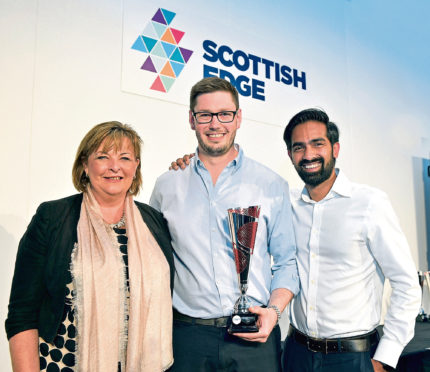A Scottish start-up company is on track to revolutionise the animal feed industry by producing an omega3-rich nutrient using the by-products of the whisky industry.
Douglas Martin, founder of MiAlgae, has developed a process that uses pot ale – a waste product of the distillation process – to cultivate microalgae, which can be added to feed for farmed fish or livestock.
Founded by Mr Martin in 2016 while a masters student at Edinburgh University, the young company has been fattened with a round of awards and funding worth £630,000 in recent months.
The first was the Shell Livewire programme earlier this year, which the Anglo-Dutch oil and gas giant established to help scale up “game-changing” businesses.
MiAlgae was awarded £30,000 through the programme, while Mr Martin was crowned the Shell Livewire Young Entrepreneur of the Year 2017.
The company was described as one of Britain’s “brightest, most promising innovations to support a more sustainable, low-carbon world”.
Not only does MiAlgae’s product promise to develop a safe and sustainable foodstuff, particularly for the aquaculture industry, but the algae growth process also cleans up the distillery waste byproducts so that it can be discharged safely back into the environment.
There is no shortage of material MiAlgae can use – it is estimated the whisky sector produces 4.37 million tonnes of bio-based waste and byproducts a year.
>> Keep up to date with the latest farming news with The P&J Farming newsletter
The idea to develop algae for nutrition first hit the microbiologist when he was working for an offshore shipping contractor in the North Sea. Looking out on an algal bloom, rich with seaweeds and microscopic phytoplankton but dangerous to marine life and a nuisance to his crew, Mr Martin thought there must be some other way to manage it.
He continued working for the contractor in Aberdeen while brewing and testing different strains of algae until he decided to dedicate himself full time to his start-up. Following success with Shell Livewire, the company’s awards have bloomed like the algae that inspired its founder.
In June the company confirmed a £500,000 investment from Equity Gap, the angel syndicate founded by rugby international Jock Millican, along with the Scottish Investment Bank and Edinburgh University’s Old College Capital. This was followed by a further £100,000 from Scottish Edge, the government-backed funding competitions’ maximum award.
Other support has included the Edinburgh Centre for Carbon Innovation, which delivers Climate-KIC, a pan-European business support and development initiative for start-ups focused on environmentally sustainable innovation. MiAlgae has most recently been signed up for Scottish Enterprise’s high-growth ventures programme as well as being selected for its Unlocking Ambition Challenge, a £4 million fund to support entrepreneurs chosen for the contribution they can make to the Scottish economy and wider society.
Mr Martin, who spoke to The Press and Journal after his first holiday in more than a year, says he is now ready to take the business to the next level.
“We have done pretty well, to be fair,” he says of the company’s grant- and support-winning success. “Hopefully we can stop looking for grant funding and actually get on with doing stuff.”
This involves moving into a facility in the coming weeks on the outskirts of Edinburgh, where Mr Martin and his small team will set up MiAlgae’s lab and pilot plant. The company aims to have grown from three staff to seven by the end of the year.
So far, the company has been focused on the research and development required to ensure it can develop the right type of algae, which provides the greatest nutritional benefit, and the conditions required to grow it. They can then scale production of the plant so that it can then supply an additive to feed producers.
Mr Martin said: “We identified a number of strains we could work with and we have been working to optimise that.
“That is a process we will never stop. We will remain an R&D company at heart. From our side it is about R&D, not so much going out and finding customers who love eating algae. It is much easier for us to sell to big companies that put it into feed.”
The company is not yet at this stage, although it is well on the way. And although the recent summer’s drought raised concerns about feed for land animals, Mr Martin says the “pull” for his algae food is the fish farming sector.
For farmed salmon in particular to maintain levels of omega3 for consumers, the fish must be fed a diet rich in the essential fatty acid.
Globally, the industry relies on fishmeal and fishoil sourced from pelagic fish. And while current demand for fish to feed aquaculture worldwide is thought to be sustainable, there are concerns about overfishing, especially in areas of the world where regulation can be weaker.
Likewise, demand is rising as the sector grows.
In Scotland, aquaculture, which is largely dominated by fish farming, is worth £1.8 billion per year. The Scottish Government predicts this could double to £3.6 billion or more by 2030, supporting 18,000 jobs.
A spokeswoman for Scottish Enterprise said: “We have supported MiAlgae since the early stages of its development. The funding announced in June will allow high-value R&D employment opportunities to be created in rural Scotland.
“We look forward to continuing to work with the company and its management team to support their growth ambitions.”
